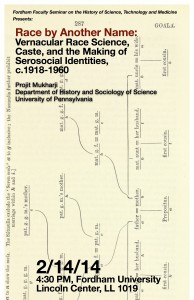 This semester, the History Department at Fordham University will be holding a seminar series on the topic of Science, Technology, Environment, and Medicine. The seminar highlights exciting new areas of research and brings together Fordham faculty with strengths in these fields with outside speakers and commentators. Our first meeting will on at 4:30PM on February 14 in room 1019 of the Lowenstein building on the Lincoln Center Campus. Our discussion will focus on the work of Dr. Projit Mukharji of the University of Pennsylvania, whose paper (abstract and paper below) is entitled “Race by Another Name: Vernacular Race Science, Caste and the Making of Serosocial Identities in India, c. 1918-60”.
This semester, the History Department at Fordham University will be holding a seminar series on the topic of Science, Technology, Environment, and Medicine. The seminar highlights exciting new areas of research and brings together Fordham faculty with strengths in these fields with outside speakers and commentators. Our first meeting will on at 4:30PM on February 14 in room 1019 of the Lowenstein building on the Lincoln Center Campus. Our discussion will focus on the work of Dr. Projit Mukharji of the University of Pennsylvania, whose paper (abstract and paper below) is entitled “Race by Another Name: Vernacular Race Science, Caste and the Making of Serosocial Identities in India, c. 1918-60”.
The History Department welcomes anyone interested to come and join us. The full paper is available to download here: HSTEM Mukharji, Race by Another Name– Vernacular Race Science and the Making of Serosocial Identities in India.
Asif Siddiqi will provide a brief commentary to start the discussion. Refreshments will be served.
Here is the paper abstract:
Race by Another Name: Vernacular Race Science, Caste and the Making of Serosocial Identities in India, c. 1918-60.
The rise of genomic investigations of race, racialized pharmaceuticals like Bidil and archeogenetic resuscitation of racialized demographic pasts, have all served to rudely awaken humanists and social scientists to the persistence of biologized imaginings of social difference in the contemporary world. In South Asia this has forced us to look beyond the few disparate accounts of racialized medicine, anthropometry and middle class enthusiasm for eugenics under colonialism, and more directly towards mainstream science’s continuing interest in biological understandings of caste. What is revealed through such an enquiry are a series of technoscientific projects for the objective enumeration and evaluation of biological difference that animated leading Indian scientists from the 1920s onwards. This was also a period when Indian scientists entered higher scientific institutions in unprecedented numbers and participated in increasingly transnational networks of science. Yet transnational networks occasionally produced more localized conversations. These conversations derived from transnational linkages, but then continued to develop locally and without necessarily flowing back into the transnational networks. These vernacular sciences succeeded—even if briefly—to mobilize significant intellectual momentum and resources. Occasionally they even created new and unique objects of study. Using the efforts to enumerate blood-group frequencies in the period between 1918 and 1960, I want to tease out both a preliminary characterization of vernacular science in the era of transnational networks as well as describe one of the earliest technoscientific efforts to establish caste on a biological basis in the 20th century.
Dr. Mukharji is Martin Meyerson Assistant Professor in Interdisciplinary Studies in the Department of History and Sociology of Science at the University of Pennsylvania. He received his PhD from University of London, and works on the intersections of colonial medicine, race science, and everyday technologies.
